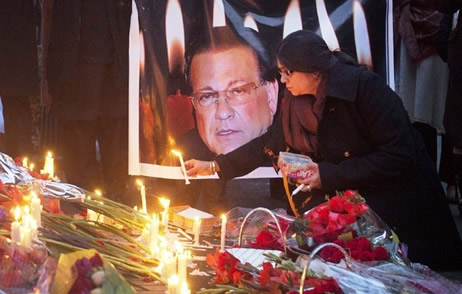Surrounded by an elite security team, Governor of Punjab Salmaan Taseer exited an Islamabad restaurant. He had been in the headlines, for fearlessly standing up for his constituents’ right to live in a safe Punjab, free from religious persecution. This right, considered standard throughout the world, cost the brave man his life. Governor Taseer became Salmaan Taseer Shaheed, as his own sick, twisted bodyguard killed him with a hail of bullets.
The Governor’s assassination was the first of a series of shattering events. Only six weeks later, Minister of Minority Affairs Shahbaz Bhatti was brutally murdered outside his mother’s home. His killers left pamphlets at the scene, declaring a Christian had no right to work for the government of an Islamic Republic. It seems to me that since the events of January 4th, 2011, Pakistan has been left reeling. It is now time for our institutions to assert themselves by standing up against extremism.
The trial of Governor Taseer’s killer was clearly an open-and-shut case. The smiling pictures of the assassin, Malik Mumtaz Qadri, were haunting. The reaction of some in the public, particularly the lawyers, was nothing short of shocking. As the Governor’s daughter and human rights campaigner Shehrbano Taseer has often said in her interviews, lawyers are the vanguards of justice and their very profession calls for them to support law and order. Yet here they were, garlanding a confessed murderer and offering their services pro bono.
As the case dragged on (complete with numerous delays and a full-on assault on the Taseer family’s lifestyle), we wondered who if the judge would be able to carry out justice. Perhaps, many progressives gloomily wondered, the judge would fear for his life and give Qadri a watered down sentence.
Yet, Judge Syed Pervez Ali Shah found Malik Mumtaz Qadri guilty of murder and sentenced him to death. The irony is, this was simultaneously an Islamic ruling (eye for an eye) and also incurred the wrath of so-called Islamists. Just as their reaction to the Governor’s assassination was repugnant, so too was their reaction to the verdict. There were countrywide protest against the conviction.
This is a crucial moment in our judicial history. Judge Shah has understood the point so many lawyers failed to understand: there can be no vigilante justice in a civilized nation. No one should be killed for his or her beliefs – not for being Christian, nor for standing up for a Christian. What Qadri did was utterly wrong, and must never be tolerated.
Of course, Judge Shah’s life is now in danger. He has received numerous death threats, and has gone on indefinite leave. His plight emphasizes the point we in Pakistan face a profound choice. Can we allow these murderous zealots to intimidate, threaten and kill our civic leaders? Will we allow them to continue oppressing the minorities of our country – to whom the white stripe of our flag is dedicated? Or can we push back against the clerical tsunami and let reason and justice triumph? As a country, we should support Judge Shah and hope the appeals court reaffirms his verdict, strongly and unequivocally declaring that no one is free to kill another person.
Enduring tragedy while maintaining the ability to show others the way forward is the true test facing our institutions today. Salmaan Taseer’s legacy continues to unfold – so great was the man and extensive the talent. Part of his legacy must be the vigorously defended bedrock principle that no public official should ever fear death for their political views.
Our judicial institutions must never validate the depraved dogma taught in nurseries of hate around our country. I applaud Judge Shah’s courage and hope the appellate court feels the same way.
![]()






